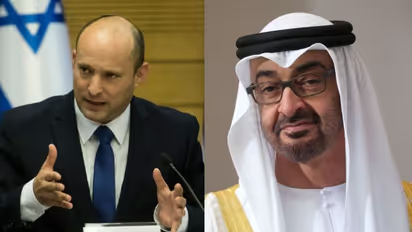Israeli PM Naftali Bennett's historic first-ever visit to UAE

Synopsis
In what marks as the first-ever visit by an Israeli prime minister to the United Arab Emirates, Naftali Bennett will travel to the UAE on Sunday (December 12) to meet the Gulf state’s de facto ruler.
In what marks the first-ever visit by an Israeli prime minister to the United Arab Emirates, Naftali Bennett will travel to the UAE on Sunday (December 12) to meet the Gulf state's de facto ruler. This is also the first high-level visit since the two countries formalised their ties last year. According to reports, Bennett informed a meeting of his cabinet that he will be travelling to the UAE and will meet Crown Prince Sheikh Mohammed bin Zayed al-Nahyan before marking his return. However, there was no immediate confirmation from Abu Dhabi.
The UAE, along with Bahrain, Sudan and Morocco, normalised ties with Israel in August 2020 under a US-sponsored initiative termed as 'Abraham Accords'. The Abraham Accords were signed by the Emirati Foreign Minister Abdullah bin Zayed Al Nahyan, the Bahraini Foreign Minister Abdullatif bin Rashid Al Zayani, Israeli Prime Minister Benjamin Netanyahu, and US President Donald Trump on September 15, 2020, at the South Lawn of the White House in Washington, DC. The accords are named after Abraham to emphasise the shared origin of belief between Judaism and Islam.
Also read: Urvashi Rautela meets ex-Israel PM Benjamin Netanyahu; gifts him Bhagavad Gita
Naftali Bennett's visit on Sunday would be the first by an Israeli PM to any of those countries since the Abraham Accords. Trips planned by his predecessor Benjamin Netanyahu were cancelled, with Israel citing Covid-19 travel curbs. According to a statement, Bennett will meet Abu Dhabi Crown Prince Sheikh Mohammed bin Zayed al-Nahyan on Monday.
Naftali Bennett's visit to the Gulf state comes amid increased regional tension as world powers attempt to renew a nuclear deal with Iran. Israel and some of the Gulf nations have shared concern over Iran's activities in the region. The Israeli statement added that Bennett and the Crown Prince are expected to discuss deepening ties, emphasising economic issues that will contribute to prosperity, welfare, and strengthening stability between the countries.